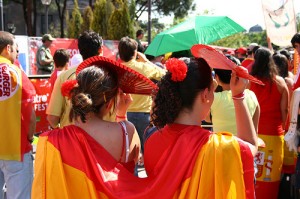
It’s pretty good to be a Spanish football fan at the moment. The reigning European champions set off for South Africa following a 6-0 victory against Poland in Murcia’s Nueva Condomina stadium that emphatically rubber-stamped the ‘tournament favourite’ tag already hanging around Spain’s neck. Poland are by no means a decent team, racking up just 11 points in a qualifying group that included San Marino and Northern Ireland, and if it were not for for Manchester United goalkeeper Tomasz Kuszczak Spain might have eased to double figures. But it is not so much the scoreline as the source of the goals that will have made Spain’s opponents – if any had failed to notice over the last two years – realise that this is a team that will not be easy to beat.
Any tournament in modern football is won not with a single team, but a squad. Vicente del Bosque has the best of each at his disposal – a squad of two very good teams. Against Poland, the moustachioed mastermind started with what could, bar the absence of Sergio Ramos, be termed his first 11: in attack, the triumvirate of Andrés Iniesta, David Villa and David Silva; behind them, Xavi, Xabi Alonso and Sergio Busquets. Gerard Piqué and Carles Puyol in the heart of defence, completing the Barcelona backbone to the national team; Joan Capdevila and Álvaro Arbeloa at fullback; Iker Casillas, the captain, leaning on one of his goalposts for most of the evening.
With Poland 3-0 down through Silva, Villa and Alonso, Del Bosque started to shuffle his picture card-bestrewn deck. Villa was replaced by Fernando Torres, Xavi made way for Arsenal captain Casc Fàbregas, Jesús Navas buzzed onto the pitch to take the place of the equally waspish Silva. Iniesta had already been removed as a precaution having aggravated a thigh injury. In his place came teammate Pedro Rodríguez.
Of the four, only Navas did not score, and the young Sevilla winger with rockets in his boots once again showed why the defences of Switzerland, Honduras and Chile can expect a torrid time when Del Bosque unleashes his plan B.
While Spain’s dominance has its foundations in possession football, accurate passing and patient build-up, Del Bosque has proved himself willing to tinker with formation and personnel as the situation requires. 4-1-4-1 is Spain’s default deployment, with Villa stalking alone up front. Iniesta and Silva play off the Barcelona man, with Xavi and Alonso behind them and Busquets screening the back four. Pedro and Navas can be deployed as outright wingers, adding width and stretching teams that prove themselves equal to the task of denying Spain through the centre. When attempts to tip-toe through a defence are thwarted, Spain can summon the bustling Fernando Llorente, a six-foot-three striker cast from the Athletic Bilbao mould. Llorente is no gazelle, but in South Africa he will be a useful beast when a team’s front door needs to be removed from its hinges. And if a long-ball game is required, who better to be aiming for Llorente’s perm than Xavi, Iniesta and Alonso.
“Anyone who thinks we’re going to go 2-0 up in the first half hour of a game and against every opponent is wrong,” reasoned Del Bosque. “What you need to do is keep possession, control the game and exploit chances. We will have opponents with different styles but we have weapons to deal with that.”
Going into the tournament, Spain holds the key advantage of being injury-free. Torres made a goalscoring return against Poland after two months on the sidelines. Fàbregas completed his rehabilitation with a strike after a similar spell on the physiotherapist’s table. Iniesta’s injury is little more than a tweak and he should be fit to start against Switzerland.
A winning aura
Del Bosque’s side also carries an aura of invincibility, having won its last 12 games and scoring an average of three in each. Since Iniesta found the net against England at Old Trafford in 2007, Spain has won 44 of its 48 matches. Following the 3-0 semi-final win over Russia at Euro 2008, only the United States has dented Spain’s otherwise perfect record of 27 played, 26 won.
The path may not be easy, but then neither was Spain’s 2008 triumph in Austria achieved against trifling opposition as it brushed aside Italy, Germany and the Guus Hiddink-coached Russia.
In South Africa, Spain has three matches to get into its stride – Honduras and Chile may try to give them a game, and will be roundly thrashed for their pugnacity, while a limited Switzerland side drilled by Ottmar Hitzfeld will not venture unduly over the halfway line – before things get somewhat stickier. Paired with the Group of Death, Spain will play one of Brazil, Portugal or Ivory Coast in the second round, despite what North Korea’s Glorious Leader may have his subjects believe. Another quarter-final against Italy may await, with the mercurial Dutch in the same half of the draw. A semi-final is likely to feature France, Argentina, England or Germany.
The prize for Spain is to be ordained into the exclusive club of teams to have held both the world and European titles –Beckenbaur’s Germany, Zidane-inspired France– and to be added to the list of peerless sides of their age: the Brazil teams of Pelé and Zico, Cruyff’s total-footballing Dutch masters and Klinsmann’s 1990 world champions.
It means little less than immortality. And it’s just seven unbeaten games away.
Leave a Reply
You must be logged in to post a comment.